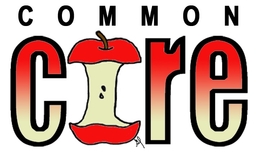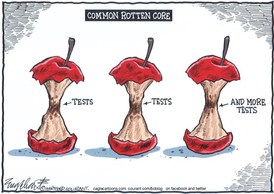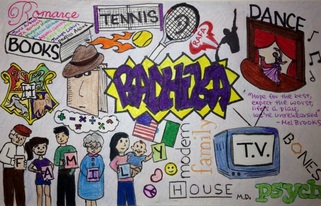Common Core?
How about
a Creativity Core

The Assignment: For my English final exam, we are given two articles to read in class, and we have to write an essay related to and including information from those two articles. This essay was a take-home practice for the final.
Before writing the essay, our class watched a video of Louis C. K. on Letterman, when he spoke about how his kids have been affected by the Common Core.
Nazaryan's article was a response to the video, and Ravitz's article was a blog post in response to Nazaryan.
The part that spoke to me most was when Louis C.K. said that math makes his kids cry. If learning makes a student cry, something is wrong. I decided to write an essay about what kind of curriculum would make kids find the joy in learning.

Our current educational system is clearly in need of change. This statement is partially evidenced by our low scores on international exams. In her blog post, education historian Diane Ravitz argues that despite our mediocre scores on these tests, we have pulled ahead of other countries economically and technologically. But saying mediocre test scores are okay just because “we have been getting mediocre scores on international tests since the first such test was offered” sounds like a poor excuse.
It only took a few well-educated and innately intelligent Americans to invent the personal computer, envision the Internet, and market the smartphone. If we can become so successful with the creativity and intellect of a small percentage of Americans, just imagine how much more we can do once we tap into the undiscovered potential of all those Americans who don’t have a proper education.
The new generation of innovators can learn from mistakes—such as the destruction to earth caused by over-consumption of resources or the loss of social awareness that comes with technology—that the older generation of innovators did not foresee. A combination of an American culture that promotes individual thought and an overall improvement of educational standards can only work to produce a more intelligent and capable generation of citizens.

When it came to reading books, he encouraged each student to come up with his or her own bucket list of books; we could read what we wanted to read. We spent class time freewriting and creating poetry and artwork. In class, we were encouraged to listen to music that inspired us. Grades were not emphasized. And although it did not seem like the traditional English class wrought with essay writing, the lessons we learned helped transform us into more eloquent writers. Not surprisingly, this was the first English class that I enjoyed and actually felt inspired by.
This classroom setting seems idealistic—graded assignments are sometimes required and certain books must be read—but a nationwide reconstruction of education that makes schools more like my English class seems like a step in the right direction. From my experience, a teacher and a school system that encourage learning for the love of learning is one of the most important factors of a good educational standard.

While the Common Core is certainly flawed in its execution, it’s ideal of implementing a standard across the country has much potential. We just need to figure out what that standard should be.
 RSS Feed
RSS Feed